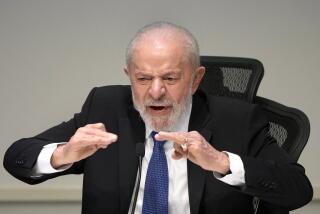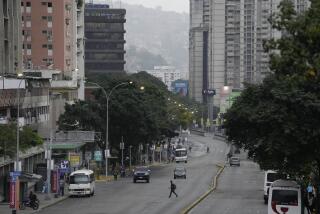Socialist Captures Spot in Brazil Runoff : South America: Luis da Silva will face Fernando Collor in final presidential voting Dec. 27.
RIO DE JANEIRO — Luis Inacio da Silva, a former automobile worker representing an alliance of Marxists and other leftists, has advanced to a December runoff in Brazil’s presidential elections, according to official voting returns announced Sunday.
Da Silva, known as Lula, will face Fernando Collor de Mello, who portrays himself as a centrist reformer, in the runoff Dec. 27. If Lula wins, Latin America’s largest country will have a socialist president after 26 years of conservative government, including 21 years of military rule.
In early returns from the first round of voting Wednesday, Collor seized first place by a wide margin. But the outcome of a close race for second place, and for the other position in the runoff, remained unclear until Sunday.
With 98% of the votes tabulated, Lula finally emerged with a definitive lead over left-leaning populist Leonel Brizola.
The official count gave Lula 11,391,908 votes, or 16.7%, to Brizola’s 11,120,672 votes, or 15.7%. Collor remained far ahead with 20 million votes, or 28% of the total.
Social Democratic candidate Mario Covas finished in fourth place with 7.7 million votes, and conservative Paulo Maluf came in fifth with 5.9 million.
Lula, 44, is a gruff-voiced man with a stocky build and a black beard. His rise to the heights of Brazilian presidential politics is remarkable not only because of his leftist ideological position but also because of his working-class background and his low level of formal education.
The son of an impoverished single mother, he did not learn to read until he was 10 and never went beyond grade school. He began working in an automotive shop when he was 14 years old.
After working his way up to a skilled job as a lathe operator, he won election in 1975 as the president of an automotive metalworkers’ union in a Sao Paulo industrial suburb. In 1979, he attained national prominence by leading a strike in defiance of the military regime that then ruled Brazil.
The strike movement spread rapidly to become a symbol of popular discontent with the military government, which banned Lula from union leadership. He was imprisoned in 1980.
As the regime eased its restrictions on political activity, Lula helped found the leftist Workers’ Party, uniting Marxists, Trotskyites, Roman Catholic leftists and others who advocate a socialist economic and political system. The party’s symbol is a red star.
As the party’s leader, Lula won election to the lower house of the national Congress in 1986, the year after the armed forces turned the government over to transitional President Jose Sarney, a conservative civilian.
For the current campaign, Lula’s party joined the Brazilian Socialist Party and the Communist Party in what they call the Brazil Front.
Lula has promised to work with the private sector and welcome private foreign investment in Brazil. But he also has called for suspension of foreign debt payments, socialized medicine, agrarian reform and the nationalization of public transportation and private banks.
Collor, 40, was a member of the conservative party that supported the military government when he was elected to the Congress in 1982. But he switched to the Brazilian Democratic Movement Party, which long opposed the military regime, before winning election in 1986 as governor of Alagoas, a small state in Brazil’s impoverished northeast.
As governor, he won national fame by campaigning against overpaid public servants called “maharajas.” As the presidential candidate of his newly formed National Reconstruction Party, Collor drew strong support from Brazil’s underpaid lower classes, which form the overwhelming majority of the country’s 145-million population.
His campaign strategists have begun presenting him as a progressive social democrat in an appeal for votes from the center-left.
More to Read
Sign up for Essential California
The most important California stories and recommendations in your inbox every morning.
You may occasionally receive promotional content from the Los Angeles Times.









